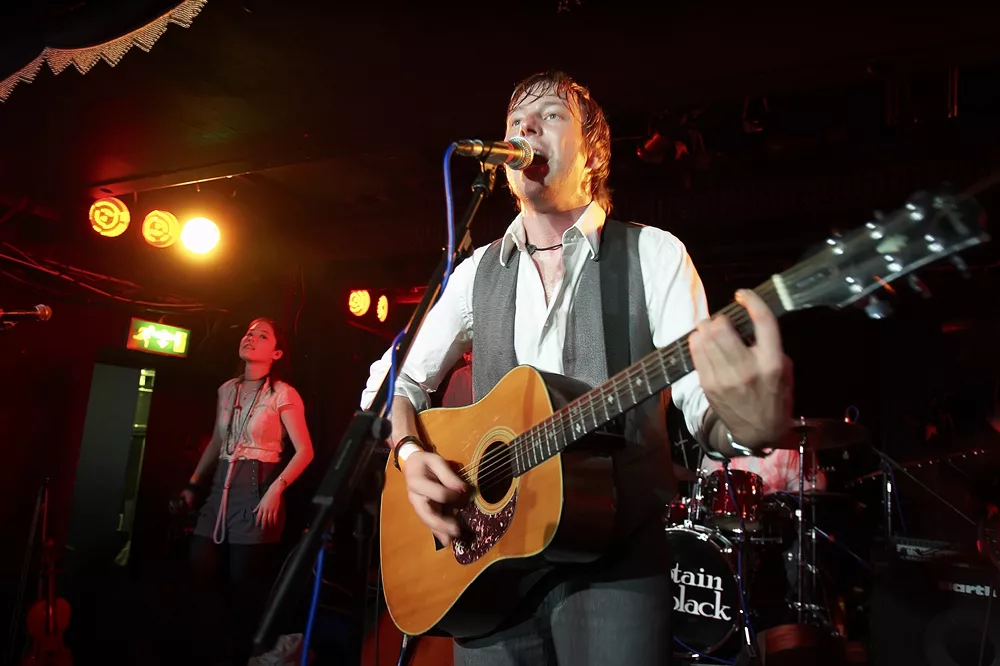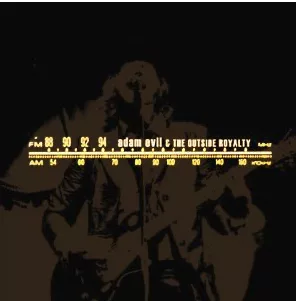The Night I First Heard Adam Evil and the Outside Royalty
Some nights stick with you, etched into memory, not because of what you played, but because of what you witnessed. For me, one of those nights was the first time I heard Adam Evil and the Outside Royalty, and it happened at the culmination of one of the most ambitious events of my mid to late 20s.
Down on Jane Was on Hiatus, But Creativity Never Stopped
At that point, Down on Jane had officially been on hiatus. We weren’t practicing or playing or even sure what the next chapter looked like. But creativity didn’t stop.
Dan Calig, our bassist, and I (Rob) were partners in two ventures outside of the band: Red Guitar Media, a creative ad agency, and Pach Publishing, which launched The Front, a biweekly arts-and-entertainment newspaper. These companies were separate from Down on Jane, but naturally, both helped promote the band and our projects.
In a way, Red Guitar Media and Pach Publishing mirrored the same kind of ambition we admired in Adam Evil. Just as they were pushing to sound bigger than Pittsburgh, we were trying to think bigger than Pittsburgh, through media, marketing, and storytelling. All of us were reaching for something beyond the city’s borders, even if we were rooted here.
The Media Rivalry: The Front vs. Deek
But that ambition came with competition. As The Front was growing, Deek Magazine, run by editor/publisher Matt Stroud, was carving out its own space in Pittsburgh’s indie press.
The two publications couldn’t have been more different in style. Deek was glossy, edgy, and forward-looking. The Front was scrappy and grassroots, hyper-local, raw around the edges, and unapologetically focused on Pittsburgh’s arts and creativity.
Those differences fueled a rivalry. Dan and Stroud often went head-to-head in print, sparring through editorials and coverage choices. And right after The Front’s very first issue, Matt fired off a perfectly Pittsburgh note to Dan, half-backhanded, half-heartfelt: “Can’t believe you published it… congrats.” It was a snarky little olive branch that said everything about that era: competitive, cheeky, and absolutely alive.
All of this unfolded in a market long dominated by Pittsburgh City Paper, where everyone was waiting for a challenger to dethrone the weekly as the city’s cultural authority.
For me, I’d come out of Pulp Weekly, a short-lived experiment launched with some of the old guard from In Pittsburgh. Pulp fizzled, but it taught me what an alt-weekly could be; in many ways, The Front was an attempt to carry that torch forward.
In hindsight, the rivalry between The Front and Deek felt a lot like what Adam Evil and the Outside Royalty represented in the music scene. Just as we were both trying to challenge City Paper’s dominance in print, Adam Evil was shaking up Pittsburgh’s sonic order. Both battles were about claiming a new crown.
The Four Corners Party: A Scene-Defining Celebration
That competitive, electric atmosphere led us to throw the Four Corners Party for The Front’s one-year anniversary. We rented the entire top floor of the Terminal Buildings on the South Side. Sonoma Grill brought in food and wine. We had ad space on PAT buses and even landed a feature on Fox 53 with local commercials. The room buzzed with live painting and sculpture, readings and performances, a cross-pollination of every art form we could pack in.
And at the center of it all was Adam Evil and the Outside Royalty.
When the Strings Hit, You Knew It Was Different
The moment they started, the energy shifted. Strings, violin and cello, wove into their rock sound, not as decoration but as the lifeblood of the songs. Their writing carried weight, their hooks dug in deep, their presence made it feel like the Terminal Buildings had been transformed into a venue far larger than Pittsburgh.
I realized that night how far Down on Jane had to go. Even in our best moments, we had been sketches. Adam Evil and the Outside Royalty were full canvases.
The Front’s Favorite Band
It wasn’t just me who believed in them. The Front supported them heavily, featuring them as one of our favorite bands in the city. They represented the ambition and possibility we wanted Pittsburgh to see in itself.
And the Pittsburgh music scene of the early 2000s was no lightweight. It was diverse and buzzing:
- Modey Lemon brought raw, garagey energy, distorted riffs and primal noise that felt like a sweaty basement show even when they hit bigger stages.
- The Juliana Theory leaned polished and emotional, a post-hardcore/emo powerhouse with national reach.
- Don Caballero were the math-rock titans, instrumental, angular, and cerebral.
- Zao kept the hardcore/metalcore flame burning, heavy, relentless.
- Punchline delivered melodic pop-punk hooks and constant touring.
- Anti-Flag carried the political-punk torch on the international stage.
- The Clarks remained the city’s rock-and-roll elder statesmen.
- Grapevine held down the soulful, jam-driven corner, long, communal grooves.
- Too Tall Jones brought an experimental edge, part art-rock, part indie grit.
Against that backdrop, Adam Evil and the Outside Royalty stood out because they were none of those things. They weren’t raw garage, emo-polished, math, hardcore, or political. They were theatrical, ambitious, cinematic, closer in spirit to bands like The National or Arcade Fire than anything else happening in our city at the time.
From Pittsburgh to London
In 2006, four of the members left Pittsburgh for London, rebranding as The Outside Royalty and dropping “Adam Evil” from their name. And in a way, that move validated everything I felt the first night I saw them. They had to leave. They’d already outgrown Pittsburgh.
London was the right stage for their ambition. There, they played sold-out shows at Club NME at Koko, toured with the Young Knives and Pete and the Pirates, and in 2009 opened for The Cranberries across Europe. They became Virgin “Road to V” finalists and earned a reputation as one of the most exciting new bands on the UK indie circuit.
By 2011, though, the ride had slowed. Their last recorded performance came that year, and while they never announced a breakup, the band has been silent since. No future shows. No comeback. Just the memory of what they were.

The Legacy of That Night
Looking back now, the Four Corners Party wasn’t just an anniversary for a scrappy arts newspaper. It was a moment of vision. It showed what Pittsburgh was capable of producing, and what it could lose when its best bands left for bigger stages.
For me, it was also a marker. A night when Down on Jane wasn’t even active, but I felt the challenge laid down in front of us. Adam Evil and the Outside Royalty set a standard that still echoes in my head whenever I think about music, ambition, and the scene we came from.
Their London chapter proved we weren’t imagining it. They really were destined for something bigger, and they showed us what could happen when you refused to play small.
They were an awesome Pittsburgh band of the early 2000s, and their legacy isn’t just in the shows they played or the records they left behind. It’s in the reminder that for one incredible night in the South Side, surrounded by art and sound, we saw what was possible. And that memory still drives me today.

